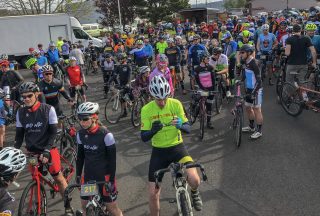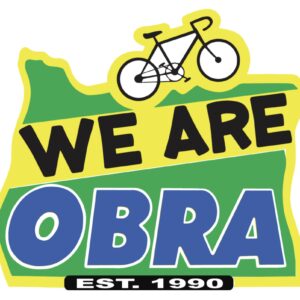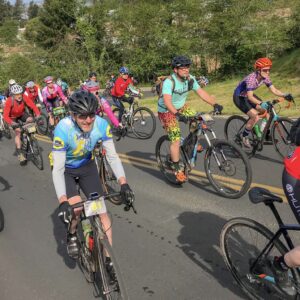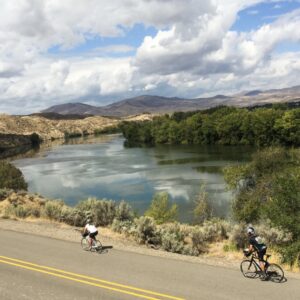“This won’t be an off-the-cuff approach. This is serious business and we’re taking it seriously.”
— Mike Ripley, Mudslinger Events
If there’s one word that defines what race promoters face right now it’s uncertainty. They don’t know when events will happen again, what they’ll look like when they do, whether people will sign-up for them, or what it will take to keep people safe from Covid-19.
“It’s up to individual race promoters to prove they are in compliance.”
— Chuck Kenlan, OBRA
After months of juggling dates and shoving events down the calendar, the Oregon Bicycle Racing Association announced yesterday their new plan is to defer all scheduling decisions to medical best practices and health guidelines. “OBRA will no longer be setting future dates for the suspension of racing,” Executive Director Chuck Kenlan shared yesterday. “Rather, we are relying on federal, state and local jurisdictions’ guidelines for outdoor gatherings and sporting events. It is up to individual race promoters to prove they are in compliance with the restrictions and guidelines of the jurisdictions where they are operating.”
Each race promoter will have to draft a plan that will then be evaluated by a new “medical advisory team” assembled by OBRA. This team is made up of bike racing veterans who are also medical professionals. The team includes longtime OBRA board member Mike Murray, physician and coach Anne Linton, and physician’s assistant and pro racer Beth Ann Orton. They’ll be charged with assessing race plans and adding additional guidelines if and when necessary.
There are many facets of a race that raise concerns in a crowd-resistant Covid-19 world: Registration tables, restrooms, awards ceremonies, mass starts, feed zones, and parking.
OBRA met with promoters from throughout Oregon last week to help them think through potential restrictions and health guidelines. OBRA also launched an online survey for members to help inform promoters. The survey aims to gauge would-be racers’ comfort levels around things like a potential mask requirement, higher registration fees, major changes to race formats, comfort with travel, and so on.
Advertisement
Kenlan says they haven’t received any plans yet.
Mudslinger Events owners Andi Ripley and her husband Mike Ripley put on races all over Oregon. Last year they organized and promoted 15 events and hosted 3,000 participants. Now unemployed and facing a gross sales loss of $90,000 (and counting), Mike said in an interview yesterday that Covid-19 just adds another layer to his work. “We have to be able to balance so many factors when we put on an event,” he said. “For my part, I’m not that stressed out other than having the family budget gutted.”
Mike added that his strong working relationships with land managers, staff, volunteers, and permitting authorities will help him through this difficult time.
As for his many popular events, Mike said he’s working on a “bottom-up mitigation plan” that could result in large no-contact events and put him at the forefront of Covid-19 safety for bike races. He’s thinking through every facet of race-day — from feed zones where snacks are in pre-packed bags for pick-up, to an individual time-trial format instead of group starts. Virtual events are also likely in Mudslinger’s future.
Kris Schamp is the owner of Portland Racing and puts on the popular Short Track MTB series at Portland International Raceway (among other events). “The big elephant in the room,” he shared via email this morning, “Is really whether it is at all feasible to have a bike race and abide to the six-foot social distancing rule.” “To be frank, I don’t see how that is possible without bending or breaking that rule, except when you would make masks mandatory or change the format of the race to a time trial.”
Whatever happens, Mudslinger’s Ripley isn’t slinking away from the challenge. Working closely with OBRA, he’s optimistic racing will return but realistic about the work it will take. “This won’t be an off-the-cuff approach. This is serious business and we’re taking it seriously.”
— Jonathan Maus: (503) 706-8804, @jonathan_maus on Twitter and jonathan@bikeportland.org
— Get our headlines delivered to your inbox.
— Support this independent community media outlet with a one-time contribution or monthly subscription.








Thanks for reading.
BikePortland has served this community with independent community journalism since 2005. We rely on subscriptions from readers like you to survive. Your financial support is vital in keeping this valuable resource alive and well.
Please subscribe today to strengthen and expand our work.
If Timberline is reopening for skiing this Friday I can’t see how it would be any more dangerous to do a time trial, mountain bike or gravel race where riders are not spending a lot of time in a big pack like road racing.
If you look at images of most gravel races, there are long lines of riders, usually until near the end, when fatigue and fitness separate the winners from the losers.
In Oregon the average gravel race is less than 250 people spread out over wide hilly gravel roads. Within a couple of miles things are spread out. By the end it is a trickle of 1 or 2 riders coming in every couple of minutes. A bit of staggered staging could keep things spread even better. It is nothing like the 1000’s of people at the Dirty Kanza on a dead flat course. I’ve done the Oregon Gravel Epic on the coast and a “pack” of 3 people riding together is more normal and by mile 10 I don’t think I could see more than 10 people withing 100 meters of me. The Ochoco Gravel Roubaix has always had a larger pack of riders on the flat lead in to the hills but once the hills start things break up very quickly. If you look at the finish times it is mainly 1 person coming in alone and then some smaller groups with the same time.
What, are they checking everyone for Herpes?
This might well be the death of bike racing in Oregon. I was OBRA, before there was an OBRA. I was the District Representative for US Cycling Federation and granted all permits for bike racing (road, mountain, etc.), back in the mid-80’s. The article does not give specific enough details BUT, bike promotion is essentially a seat-of-the-pants, low budget, low reward, enterprise. A very few promotors used to make ‘real money’, but I don’t think any do now. Most do it out of ‘love of the sport’. These demands will take out all their motivation. I don’t know why OBRA is demanding these steps; I can only assume that it is to placate their insurance provider. Promotors would be much better to go ‘bare’, meaning no insurance, other than the minimal liability policy required to satisfy the land-owners (city, county, state road authorities), make sure they have an iron-clad release of liability and go for it. I doubt any will (one lawsuit would bankrupt an individual), and the sport will fold. I hope that I am wrong; we shall see.
As you note, most promoters are not putting on a race for the money and OBRA pretty much only charges promoters a per rider fee so if you don’t have a lot of participants the race does not cost much to put on. Both those factors mean that taking a year off will have next to no impact on race promoters. The minimum liability is usually $1,000,000 for any landowner. The big issues for events these days are the travel restrictions and riders that are scared of getting a potentially deadly disease from an event that is supposed to be fun. The biggest losers are going to be the giant running events like Hood to Coast, Portland Marathon, and countless others. They surely have huge fixed costs that they incur regardless of if they see any participants. I’m not an OBRA official but I have put on races and all this says is that OBRA events have to follow local and state regulations for bikes races and OBRA will provide help for promotes to make sure they minimize the chances for infection. OBRA is not the gating item for putting on an event at this time.
You left out OBRA officials ($500 to $1000 per day), EMT ($100 if you’re lucky), volunteer expenses (lunches, gas) $100+. certified flaggers ($300 to $500), I could go on. Nowadays, I would budget $1500 minimum. If you break even on a first-time event, it is a miracle. I always hoped to break even by the second year. btw, I promoted over 50 races, including many State championships, and several major Pro one-day races (One day budget sans prize money), $10,000 minimum.
I’ve been helping my team put on and put on small off road OBRA events myself for the last few decades. I don’t doubt the costs you mention might be good for a road race or large event like a Cross Crusade race but for a small off-road event it is much less. For small a small off-road (less than 200 racers) race you might have 1-2 officials, the EMT is a teammate’s spouse, and you don’t need flaggers.
Domestically road racing has declined dramatically over the last decade. Part of it is just that there is not much demand for road races but the other part is the expenses you lay out. A bunch of officals, lead/follow cars for multiple fields, flaggers, etc. add up quickly. Far more people show up for an off-road event and it costs less to put on.
You’re right. I promoted all types of races. I did MTB races, and was pretty successful at it financially, until the Forest Service decided that, rather than pay a flat fee of around $150 for use of the trails, that they wanted that, PLUS $3 participant. and, yes it is much easier to put on a mountain bike race: mark the course, line then up. shoot off the starting gun, count them as they finish. So easy!
“Virus safe”. Wow…that’s one for the bureaucrats. So when someone gets “the virus”…can people now sue these shoestring operations? There are so many things out in the world which are horrible…truly horrible…and now this nebulous virus is taking the few joys we have in life…for how long? Nobody knows.